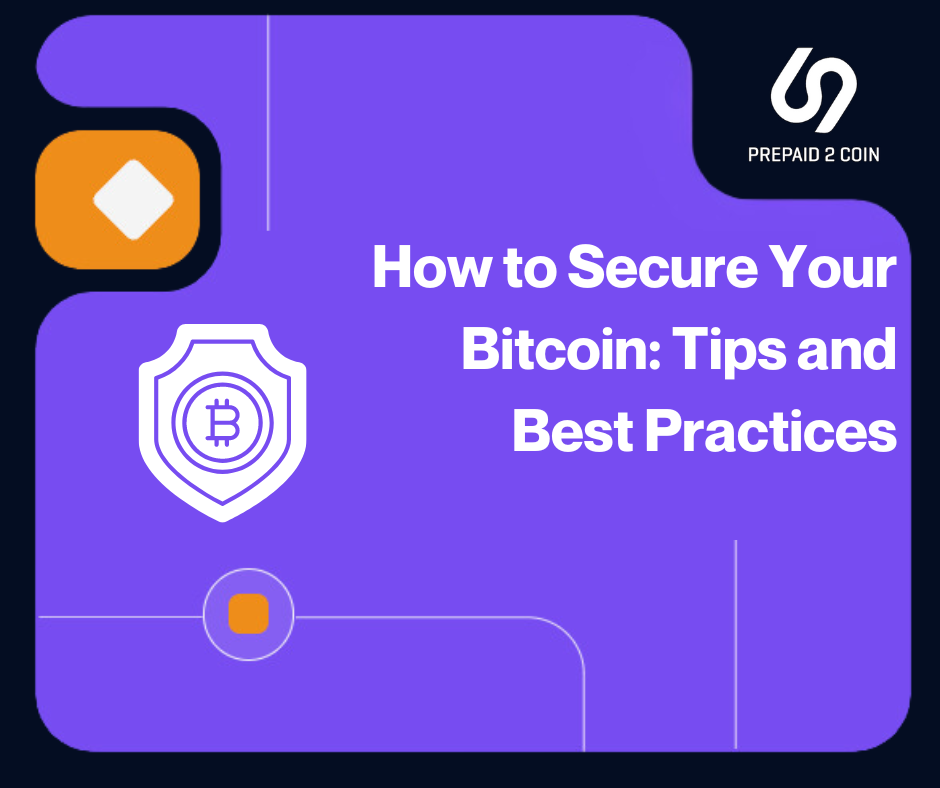
















 How to Secure Your Bitcoin: Tips and Best Practices
How to Secure Your Bitcoin: Tips and Best Practices
As the popularity of Bitcoin and other cryptocurrencies continues to rise, so does the importance of securing your digital assets. Unlike traditional banking, where institutions provide a layer of security, managing Bitcoin security falls largely on the individual. This blog will provide you with essential tips and best practices to ensure your Bitcoin remains safe from theft, fraud, and loss.
Bitcoin operates on a decentralized network, making it inherently secure against systemic failures and central authority interference. However, this decentralization also means that securing your Bitcoin is your responsibility. Here are some fundamental aspects of Bitcoin security:
Private Keys: Your private key is a secret number that allows you to access and manage your Bitcoin. If someone else gains access to your private key, they can control your Bitcoin.
Wallets: Bitcoin wallets store your private keys. There are various types of wallets, each with different security features.
Hardware Wallets:
These are physical devices that store your private keys offline. They are considered one of the most secure ways to store Bitcoin as they are immune to online hacking attempts.
Popular hardware wallets include Ledger Nano S, Ledger Nano X, and Trezor.
Software Wallets:
These are applications or programs you install on your computer or smartphone. They can be convenient but are more vulnerable to malware and hacking.
Examples include Exodus, Electrum, and Mycelium.
Web Wallets:
These are online services that store your private keys on their servers. While convenient for access, they are more susceptible to hacking.
Examples include Coinbase and Blockchain.info.
Paper Wallets:
These are physical pieces of paper with your private keys and QR codes printed on them. They are secure from online attacks but must be kept safe from physical damage or loss.
Use a Hardware Wallet:
For long-term storage of significant amounts of Bitcoin, use a hardware wallet. These devices store your private keys offline, making them highly secure against online threats.
Enable Two-Factor Authentication (2FA):
For any online wallets or exchanges you use, enable two-factor authentication. This adds an extra layer of security by requiring a second form of verification (usually a code sent to your mobile device) before accessing your account.
Create Strong Passwords:
Use complex, unique passwords for your wallets and accounts. Avoid using easily guessable information such as birthdays or common words. Consider using a password manager to generate and store strong passwords.
Backup Your Wallet:
Regularly back up your wallet and store the backup in a secure location. For software and paper wallets, this means keeping multiple copies in different locations. For hardware wallets, this involves writing down your recovery seed and storing it securely.
Keep Your Software Updated:
Ensure that your wallet software and any other applications you use are always up-to-date. Updates often include security patches that protect against new vulnerabilities.
Be Cautious of Phishing Scams:
Be wary of emails, messages, or websites that ask for your private keys or login credentials. Always double-check URLs and only enter your information on trusted websites.
Secure Your Devices:
Protect your computer and mobile devices with antivirus software, firewalls, and encryption. Avoid accessing your wallets on public or unsecured Wi-Fi networks.
Use Multi-Signature Wallets:
Multi-signature wallets require multiple private keys to authorize a transaction. This adds an additional layer of security, as multiple keys (often held by different people) are needed to move your Bitcoin.
Stay Informed:
The world of cryptocurrency is constantly evolving. Stay informed about the latest security threats and best practices by following reputable news sources, forums, and communities.
Securing your Bitcoin is crucial to protect your digital assets from theft, fraud, and loss. By following these tips and best practices, you can significantly enhance the security of your Bitcoin holdings. Remember that while the decentralized nature of Bitcoin offers many advantages, it also means that the responsibility for security lies with you. By taking proactive steps to safeguard your Bitcoin, you can enjoy the benefits of cryptocurrency with peace of mind.
Stay vigilant, stay informed, and prioritize security to ensure your Bitcoin remains safe and secure in this ever-evolving digital landscape.